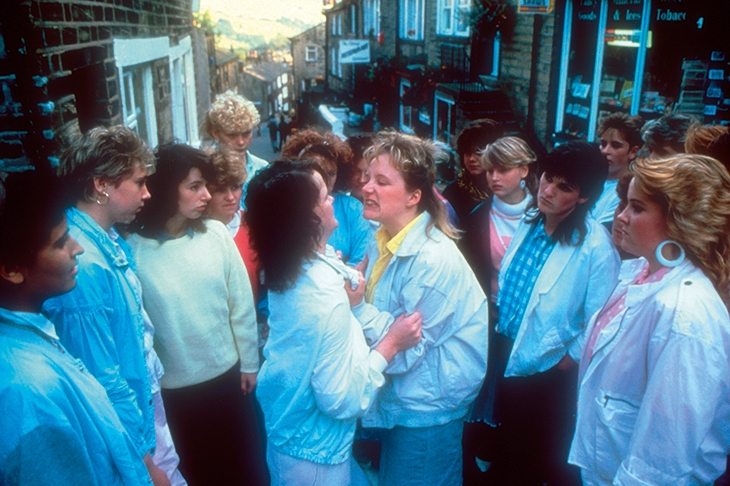Two 16-year-old schoolgirls from a sink estate in Bradford find fun and happiness by shacking up with a middle-aged married man — if you’ve never seen it, it sounds like the worst movie ever made. Yet Rita, Sue and Bob Too was a delight, one of the best British films of the 1980s, and this month it’s being rereleased in a new restoration by the BFI.
I saw it when it first came out, in 1987, and fell head over heels in love with it. At last, here was a film about working-class life that wasn’t glum. Watching it again, 30 years on, it still feels just as fresh and funny, but the landscape it describes has changed. Billed as ‘Thatcher’s Britain with her knickers down’, it now plays like a period piece — a picture of a starker, simpler world, where Bacardi was the drug of choice and sex was something that happened on the back seat of your brother’s Ford Cortina. Another thing that’s changed is that the woman who wrote it, Andrea Dunbar, is long since dead. Once you know her story, the film changes. It’s even more engrossing, but it doesn’t seem quite so amusing any more.
Andrea Dunbar was born in Bradford in 1961, one of eight children, and grew up on the Buttershaw estate, where Rita, Sue and Bob Too was filmed. She got pregnant at 15, gave birth to a stillborn baby, and wrote a play about it called The Arbor for her English CSE. Her teacher was so impressed that he sent it to Yorkshire TV, who turned it down (they said the language was unaccept-able). Dunbar left school at 16, had three children by three different men, and ended up in a refuge for battered women. One of the women she met there had been in a theatre group in Leeds. Dunbar told her about The Arbor. Her friend read the script and loved it, and sent it to Max Stafford-Clark, artistic director of the Royal Court Theatre. He decided to put it on. Dunbar had never been to London before — she’d never even been inside a theatre.
The Arbor got rave reviews and the Royal Court asked Dunbar to write another play. She wrote Rita, Sue and Bob Too, which was an even bigger hit. Oscar Lewenstein asked her to write a screenplay, and hired Alan Clarke to direct it. In 1986, a film crew arrived on the Buttershaw estate, where Dunbar was still living. Like The Arbor, Rita, Sue and Bob Too was drawn from her life on this estate: like Sue, she’d been beaten up by her boyfriend; like Sue, she’d shagged a married man. Now that her life had become a movie her relations with her neighbours shifted. A lot of them assumed that now she must be loaded. Some of them weren’t pleased with the way she’d depicted life on their estate.
Dunbar wrote another play for the Royal Court, Shirley, about a mother and daughter who are always fighting. By all accounts it was even better, but despite her continued success, she wasn’t interested in leaving the estate. ‘I don’t want to move,’ she declared. ‘I like it here.’ Yet her new life brought her little happiness. She fell through a glass door when she was drunk and needed 60 stitches. In 1988, she was prosecuted for claiming benefits without declaring the royalties from her plays. ‘She said she regretted ever starting to write for all the trouble it had brought her,’ reported the Bradford Telegraph & Argus. She was ordered to repay £5,400 at £3 per week. She died two years later of a brain haemorrhage, aged just 29.
So what does Dunbar’s story teach us about urban deprivation? Not much (for anyone with eyes and ears, it’s all horribly familiar), but it does reveal a good deal about what makes good writing. Despite her deprivations (or maybe because of them), Dunbar’s work is heroically free of self-pity, and her characters are intensely human, with all the usual human contradictions. Bob is a shameless letch, but he treats Sue and Rita with a certain dignity. Sue’s boyfriend woos her like a lovesick swain, then beats her up for talking to another man. Sue and Rita’s relationship is the only romantic element in the movie — a love so pure that even their menage-à-trois with Bob can’t spoil it. Dunbar’s comic vision is gloriously unsentimental: sex is a laugh, romance is a con and female friendship is the only sort of love that lasts.
The film’s première, at the Brighton Film Festival, divided the critics. Some loved it, others hated it. Nigel Andrews called it a ‘male chauvinist fantasy’; in The Spectator Hilary Mantel called it ‘remorselessly indecent’. Dunbar didn’t attend the première (‘It was my birthday the day before, I got a bit pissed and felt so horrible I couldn’t travel’), but she wrote a spirited response to the film’s detractors that remains the best summary of this spunky movie. ‘The film is about the healthy relationship between two teenage girls in the last year at the local comprehensive, and the everyday traumas they share together,’ she retorted. ‘Rita and Sue take each day as it comes and, although they don’t have a great deal to laugh about, they have a natural joie de vivre.’ Andrea Dunbar didn’t have much to laugh about either, but in Rita and Sue she created two wonderfully life-affirming characters who’ll live on in the imagination long after her own sad story is forgotten.






Comments